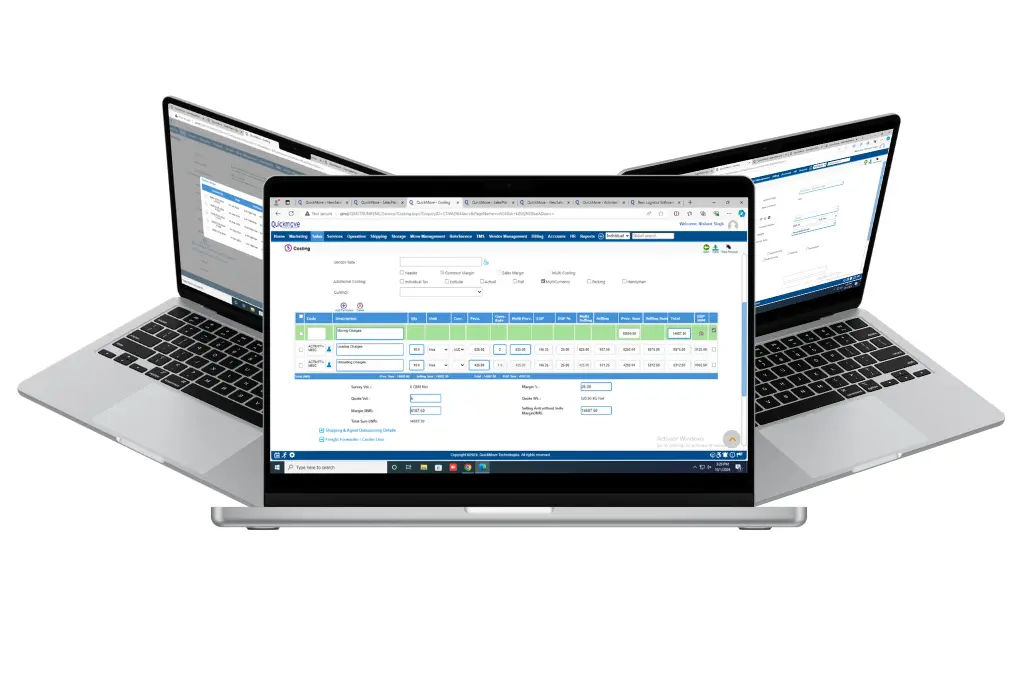The logistics industry is undergoing a transformation like never before, driven by rapid advancements in digital technology. The digital revolution is reshaping how goods are transported, stored, and delivered globally, unlocking new opportunities for efficiency, visibility, and innovation. This shift is no longer a choice but a necessity for companies aiming to stay competitive and meet the increasing demands of modern commerce. In this blog, we will explore how digital technology is transforming the logistics industry and how businesses can adapt to this new era.
1. Automation and AI in Logistics
One of the most significant changes in logistics is the adoption of automation and artificial intelligence (AI). These technologies are revolutionizing operations by automating routine tasks, optimizing routes, and predicting demand patterns. From Warehouse Management Software to robotic process automation (RPA), AI and automation help reduce human error, speed up processes, and improve overall efficiency. Companies are utilizing AI-driven platforms to automate inventory management, enhance delivery precision, and even predict equipment maintenance needs, reducing downtime and operational costs.
2. The Rise of Real-Time Tracking
Real-time tracking and visibility are becoming essential components in modern logistics operations. Customers and businesses alike expect to know the exact location and status of their goods at any given moment. GPS technology, Internet of Things (IoT) devices, and cloud-based systems enable seamless tracking of shipments throughout the entire supply chain. This level of visibility enhances transparency, enables better decision-making, and improves customer satisfaction by providing accurate delivery estimates and reducing uncertainties.
3. Blockchain for Secure and Transparent Supply Chains
Blockchain technology is gaining traction in logistics due to its potential to create secure, transparent, and tamper-proof records of transactions and shipments. It ensures the integrity of data, eliminates fraud, and simplifies complex paperwork. By recording every step of the supply chain on an immutable ledger, blockchain fosters trust between stakeholders and enhances traceability, from manufacturing to final delivery. This innovation is particularly beneficial in industries where tracking product origin and compliance is critical, such as pharmaceuticals, food, and luxury goods.
4. Big Data and Predictive Analytics
In the digital era, data is an invaluable asset. Logistics companies are increasingly leveraging big data and predictive analytics to optimize their operations. By analyzing historical data, companies can forecast demand, streamline routes, and predict potential disruptions like weather or traffic delays. Predictive analytics also empowers businesses to make informed decisions regarding inventory management, warehouse capacity, and staffing levels, reducing inefficiencies and boosting profitability.
5. Sustainability Through Technology
Sustainability has become a growing concern for the logistics industry. Digital technologies are playing a vital role in helping companies reduce their carbon footprint. Route optimization tools, electric and autonomous vehicles, and energy-efficient warehouses are just a few examples of how the industry is adopting greener practices. Moreover, the use of digital solutions like virtual inventory systems and AI-powered predictive tools helps reduce waste by minimizing overproduction and excess inventory.
6. Adapting to the New Era
To thrive in this digitally driven environment, logistics companies must embrace innovation, digitalize their processes, and invest in cutting-edge technologies. It’s not enough to simply upgrade current systems; businesses need to rethink their entire operations model to harness the full potential of these advancements. This means training staff to adapt to new technologies, collaborating with tech partners, and prioritizing cybersecurity to safeguard data integrity.
Conclusion:
The digital revolution in logistics is not just a trend—it’s a fundamental shift in how the industry operates. The companies that successfully adapt to this new era will enjoy greater efficiency, transparency, and customer satisfaction. By embracing automation, AI, blockchain, big data, and sustainable practices, logistics businesses can not only meet the demands of today but also set the foundation for a more resilient and future-proof supply chain.
 Email Us
Email Us

 Freight Forwarding Software
Freight Forwarding Software Moving/Removal Software
Moving/Removal Software Warehouse Management System
Warehouse Management System Transport Management System
Transport Management System Customer Service Portal
Customer Service Portal Move Survey Quote Pro
Move Survey Quote Pro Digital Logistics Inventory App
Digital Logistics Inventory App


We are offer seamless Luxury airport transfers in Dubai for both personal and professional trips.